Order Up
Two penguins are paddling through the desert. They are paddling as hard as they can, not going anywhere, sand is flying but they just keep paddling. Eventually one penguin sighs and says to the other: “Where’s your paddle” and the other responds “Sure does.”
Apologies for the delayed post this week. Ultimately, I am grateful to have waited as there is much to report this week nearly every day. I have picked up some projects (dangerous) and they are going swimmingly (so far). This week’s post is a mix of paddling upstream but like the unbelievable amount of rowers on the Alster at every hour of the day, I’ll be paddling backward a bit. Does my phone service finally work? Sure does!
New German number to message me for the next few months: +49 1523 1410113
The Bread
Top Slice: It was a week full of holidays. A Halloween party this weekend and Reformationstag on Monday. And I feel like I am on holiday with a workload so light I only spend one of seven days doing schoolwork. Maybe that will change, but I have a feeling it will not. This week was filled with music, sports, and weather so schön it is abnormal, but welcome in November.
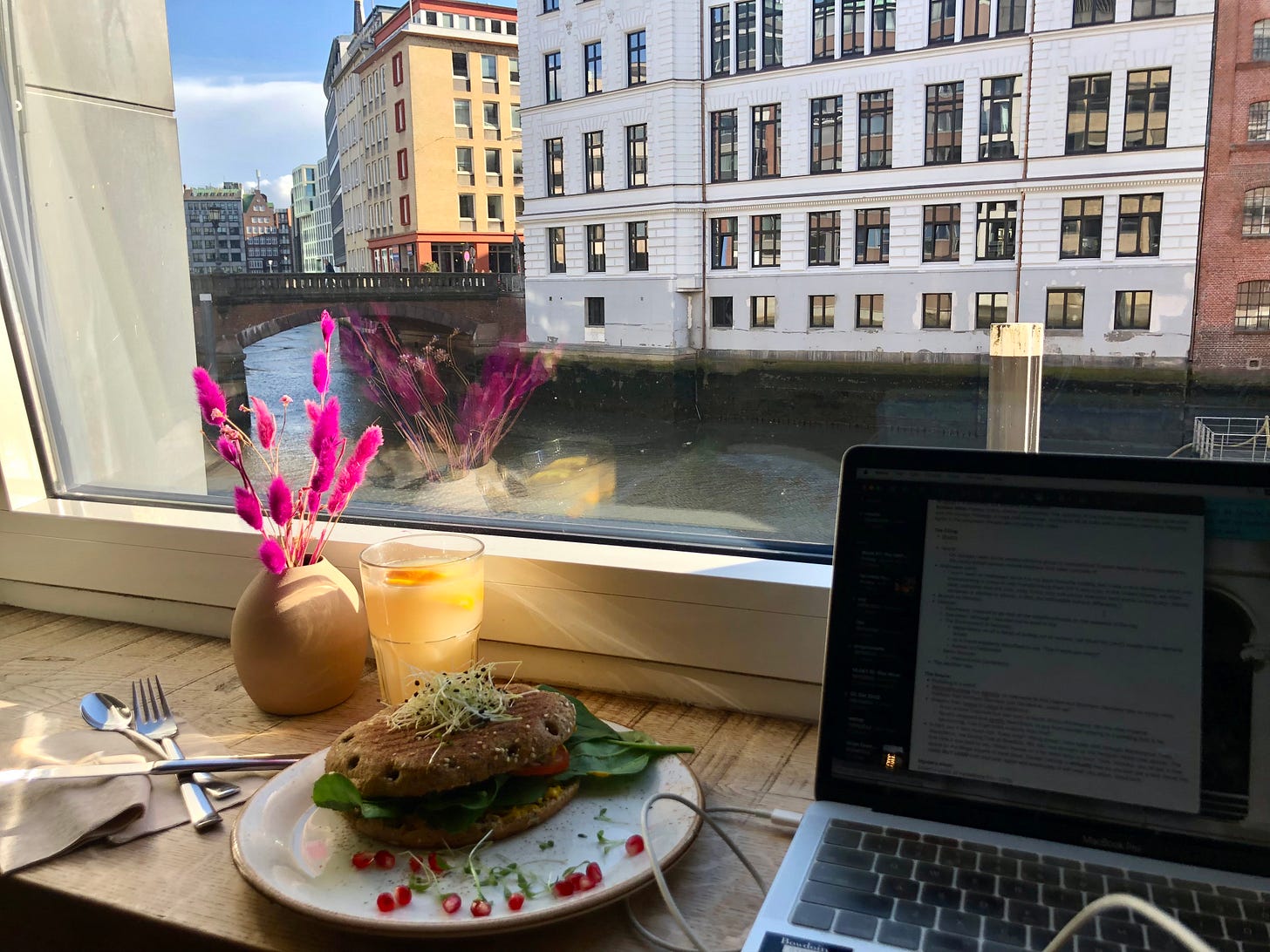
Bottom Slice: Planes, trains, and no automobiles. The upswing of the holiday season is already quite clear with the Europa Passage, a huge mall downtown, starting to fill its halls with Christmas trees and hanging lights in the alleyways. People are crowding into cafes and onto public transit and I will be reuniting with friends these next two months in Berlin, Spain, Copenhagen, and Edinburgh. And most importantly, an early birthday shout out to my first week of November people: two birthdays tomorrow and the most iconic, Doug Poppen on November 3rd.
The Filling
Party
I won’t dwell on Halloween since it is my least favourite holiday, but it was a nice dormitory party and brainstorming a costume with friends/seeing them DIY it was a joy. In the United States, we often wear costumes that are cute, witty, funny, pop-culture but everyone here wants to be scary—bloody vampires or witches or ghouls. A little, but noticeable cultural difference.
Sporty
On Sunday, I went to my weekly bouldering group of English speakers. Many are from Italy or Eastern Europe and it is organised by this lovely British person named Matthew who rants about Brexit, Britain wanting to be ‘different’ “why the hell do we drive on the opposite side of the road,” and invited the group for a British dinner. I have to take a rain check this week which is devastating but will try to dig up some ‘American’ food whatever that means (probably Cheetos) to contribute to the chaos. I learned that to ‘kip’ is to take a nap which is the only British phrase I ever need. This is abroad: learning random colloquialisms from random people not from the country you are studying in. The perk no one else is talking about.
Classy
Yesterday an alumnus from Smith College who did this study abroad program in 2009 hosted us for a brunch. It was so special to be back in a real, homey apartment with a full kitchen filled with smells of chai tea, apple and pumpkin pancakes, eggs, and everything in between. Hamburg is quite an international city but only unusually, only has one established international school which the alumnus works for. We ended up making small talk over the meal which naturally meant politics and an entire sociological overview of European’s assumptions about the United States—the majority of which immediately are negative. Needless to say, the amount of deeply traumatic things past and present the United States has been involved with cannot be summarised. There are huge problems that do not exist in Europe, especially with violence and health care. We will not defend that. The USA has massive problems. But it is a massive country with a diversity that is seldom talked about in Europe. Assumptions about the US are drawn mostly from the major cities like New York or Los Angeles that represent only a small fraction of ‘American culture.’ It makes sense; we do the same with countries like the United Kingdom and China but the amount of energy and time it takes to logic out in oneself and to other students here why the United States is the way it is is…massive and subjective and speculative. As frustrating as it has been to justify the workings of the USA that are so nuanced and at the same time, starkly wrong, it is a way to revisit every time how much a region shapes your experience and how much patience and willingness to admit you don’t know is required for productive conversation.
I remember speaking with my friend from Lyon, France my first year at Bowdoin and she is now studying a master’s in the US because her university barely talked about race in sociology and in fact, in many ways, it was taboo to do so. A comment that resonated with me during brunch was the common stereotype that “People from the US aren’t well traveled or informed about world politics.” There is so much truth to that but it depends greatly on class status. When you are working two or three jobs, it is incredibly difficult to get extended time off. Passport applications and travel prep is resource intensive with complex jargon and bureaucracy that is not tailored for newcomers. A plane ticket right now from the West Coast to the East is just as much as a one-way ticket to Europe. Many people of colour simply do not feel safe travelling in some areas of the United States or even in their own city. The dominant discourse in Northern Europe and wealthy cities like Hamburg and of course, Scandinavia exclude the reality of other socio-economic brackets and while there are more support systems in these countries to help meet basic needs, often neglect their own histories of colonisation, imperialisation, and rich culture built on the collections of art stolen from other countries deemed ‘lesser.’
I knew this piece would circulate within communities of color, which is great, but I don’t know that white people understand the need for these kinds of conversations—why we talk about race and the outdoors. I’ve seen a lot of resistance. There are many white people who say they go to the outdoors to get away from it all, of course, and they don’t want to think about it. They don’t want to feel accused. I definitely wanted to write to those people and have them see why this is an important conversation and why this is an important experience. Because most people don’t know. —"Going It Alone" Rahawa Haile on the Appalachian Trail
This week I attended the “The Benin Bronzes. Globalising the Colonial Looting of Art” conference. It was optional through my university course but the experts from Nigeria and Ghana and Paris and some of the leading scholars in repatriation presented complex, controversial, and critical arguments about ethics in art. We had to choose our topic for presentations in class this week as well and I settled on comparing the current debates about ethical restoration of objects to ethical recreation on lands were stolen and taken by force from indigenous communities. A main difference is, of course, the scale. A singular piece of art can be physically displaced and then restored to its original place. How does one ‘restore’ communities forced from their land to a place so altered by industrialisation and extraction that it continues to erode culture? Yet the Bronzes are not so simple as Dr. Kwame Opoku pointed out. Just returning a physical cultural object is not enough. The intangible cultural and spiritual meaning imbued in the original function of the objects in rituals or longstanding craft traditions has also been eroded. Where does one find it, restore it, or generate it again?
“The people of Benin have been asking for decades for the return of some of the thousands of objects looted but the British Museum which has allegedly some 700 Benin Bronzes refuses to consider such requests for restitution and does not even bother to acknowledge the existence of such requests.” —Dr. Kwame Opoku
Another alumnus was at brunch who works in a Biology lab and keeps finding herself pulled back to Hamburg. Reflecting back to how I felt the last few weeks, interested in the city but not understanding why all my friends and professors consistently said “Hamburg is the best city” I think part of this may have stemmed from moving so much in the last few years.
Exploring new places on my own is part of being an adult but why I have learned to love them is because those who knew them intimately let me be part of that knowledge. It has been a privilege to have such an enthusiastic cohort to explore with, something I have not had for awhile, but also we are approaching it from a completely new lens.
Two of my classes have ‘lit a fire under my a$$’ (a phrase I shared with the boy from Belgium), however, to motivate me to leave my cozy room. My Urban Studies class is quite cool as we delve into the history of the “Umland” or suburbs of Hamburg that are forest filled and experienced shifting borders constantly. The Professor knows every area so well that he makes me want to make little day trips to visit these places—a true Hamburg staycation and be back home before dinner. Our second class is “The Environment in Germany” which is through Smith College and I have found connections in my day to day life. We had a unit on urban gardens and the huge bunker where my climbing gym is has been in construction for a year now I believe. It is a behemoth of a building and so ugly but there were posters up to crowdfund a public rooftop garden project! Hoping that comes to fruition.
I had a fall-out with a friend. And by fall-out I mean we talked about the energy crisis in Europe while doing laps in the beautiful birch-filled Stadtpark. So romantic. Britain has already been experiencing black-outs and my friend explained that while Germany has too many checks and balances to have that happen, there simply is not enough landmass to support wind, electric, or solar power especially with the overcast weather.
“The USA has an edge on us there with how large it is,” he said. “Lockdown was in some ways, a saviour because we just were using energy faster than we could build and it was a reset.”
Likewise, while the support for sustainable is vastly larger than in the US, the supply chain demand problems have been a huge barrier in getting panels or parts produced to wean grids off oil or coal. Even commercial printers that regularly would be produced and shipped within a half year are now taking around two years. He studied business and ‘Econ bros’ (not eco) at my school were my biggest nightmare but it was a really enlightening conversation to tie together all the pieces and problems that are mentioned but seem so abstract to the general consumer. And a very concrete fall-out, Germany made the decision to pull out of nuclear energy after the consequences of Fukushima in 2011. The licences of the factories here are expiring with no plans of renewing/rebuilding so that greatly has contributed to the reliance on Russian oil. I am still not sure how I feel about nuclear and also do not have enough info about it, but tend to vye for precautionary and proactive policies.
“Pulling out of nuclear demonstrated the foresight of the government as the cost of an accident greatly outweighed the benefits. But no one could foresee how the pandemic consequences would put even more pressure on energy independence and how choices that seemed so certain then are in question now.”
When I mentioned that France was re-opening its nuclear plants he responded elegantly,
“The French are crazy.”
A man of true wisdom.
The Sauce
Germany’s holiday systems varies from region to region which I never knew. On Monday, we had Reformationstag in honour of Martin Luther’s Reformation, but almost no one in Northern Germany is Lutheran or even religious anymore. Berlin, less than two hours away, did not have a holiday. Southern Germany’s holiday is today. Apparently Reformationstag was adopted a few years ago by Hamburg because they were jealous of southern Germany where there are so many holidays aligning with the Christian tradition. So naturally, Hamburg really just picked a random paddle from the bucket and went with the holiday commemorating an angsty ex-monk who had to camp out in a castle on the run from the Catholics.
I have had three different unrelated people ask if I have tried meditation. No. But I had some relaxing moments this week. A friend who is in town surprised me on a walk with a hammock which they set up by the outer walking path right downtown. It was simply amazing—a city park nestled directly in the center but quiet, gentle, and a sky filled with stars. They are in town for the week so I got to steal some of the hotel privileges and sit in a sauna. Needless to say, I hated it and immediately jumped in the pool and did laps. Water is calming to me either way so that’s my meditation. And also apparently every room in the hotel has a Book of Mormon. Take that Reformationstag.
I finally achieved Indie-Folk Nirvana watching the third of bearded men who wear hats (not you Sam) play guitar. Gregory Alan Isakov, who is my favourite of the three I have seen (City and Colour, Iron and Wine) played on Tuesday in the venue Uebel & Gefährlich. No clue why this Coloradian rolled up to Hamburg on a weekday, but his Spotify bio actually says that “Born in Johannesburg, South Africa…horticulturist-turned-musician has cast an impressive presence on the indie-rock and folk worlds. In addition to owning his independent record label, Suitcase Town Music, he also manages a small farm in Boulder County, which provides produce to over a dozen local restaurants.” I am interested in learning more about the relationship between South Africa and Germany since there is such a stark cultural influence and history of slavery/oppression (yep. not surprising). There are eleven national languages of South Africa which include English, nine ethnic languages of Zulu and Xhosa, and Afrikaans—a mixture of Dutch and German. Will do some more research on that and not blab about it here. But when Gregory said his whole band was from Colorado, I was the lone person that cheered. Dropping some recommendations below, but the venue was in the same building mentioned above, the bunker, which hosts the bouldering gym and this random guy from Boulder, Colorado. Can it get crunchier than that?
In fact, yes it very much can. Every single hiking group I have been with through Washington Trails Association, the Outing Club at Bowdoin, REI, etc. has brought up the Penguin riddle (see above). The first time it was told to me, I think I mused on it for more than an hour. Truly. Anywho, you all get a free space on the Bingo square of boat jokes.
Except nothing is actually free so you just get a hint: Read the riddle OUT LOUD over and over again and eventually, it will wear you down. Good luck.
Mystery Meat
I’m going to visit a friend in Heidelberg this weekend. He participated in the exchange between the Überlingen Gymnasium and my high school in 2014 and we have stayed in touch over the years. Ironically, he has spent a good amount of time in Hamburg, doing a summer Praktikum or internship for his law school and a big surprise, living in Poppenbüttel—a neighbourhood north of the airport—as a young child. Poppenbüttel and a series of other towns are right along the Alster river and as I am obviously, sponsored by REI, needed to take my free HOKA Mach 5’s on a long run Sunday. Heidelberg is one of the most beautiful cities in Germany and has Philosophenweg right along the Neckar River so I will probably drag my shoes and feet along this weekend. Paul and I have been friends for more than eight years now. And every time I tell people my last name, they giggle like eight-year olds and ask me if I REALLY want to know what it means. I really didn’t and neither do you. All you need to know is that “Poppen” means puppets in Dutch and as I told Isa, it really feels like we’re puppets with no free will living in a simulation. Sure does.




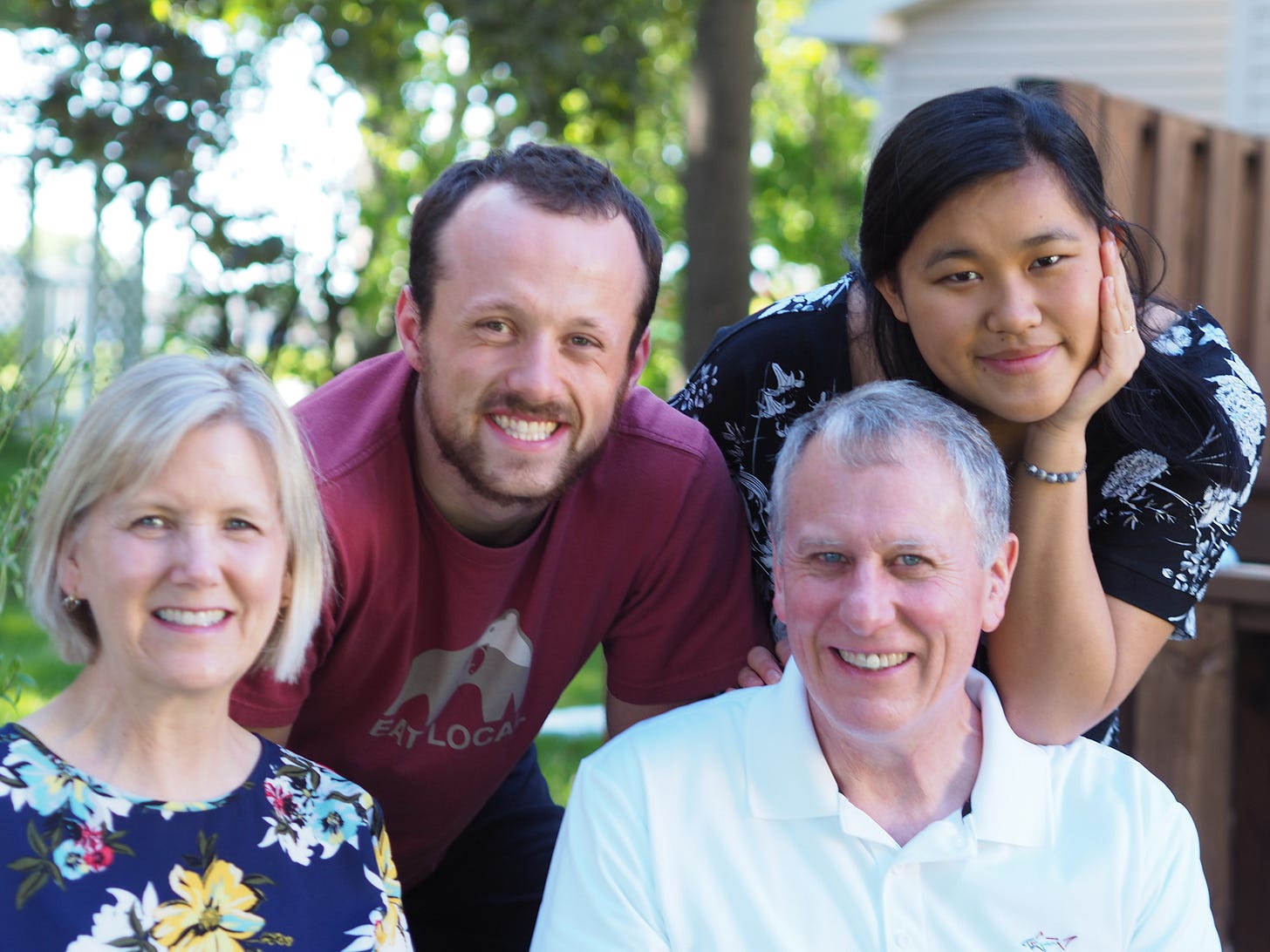
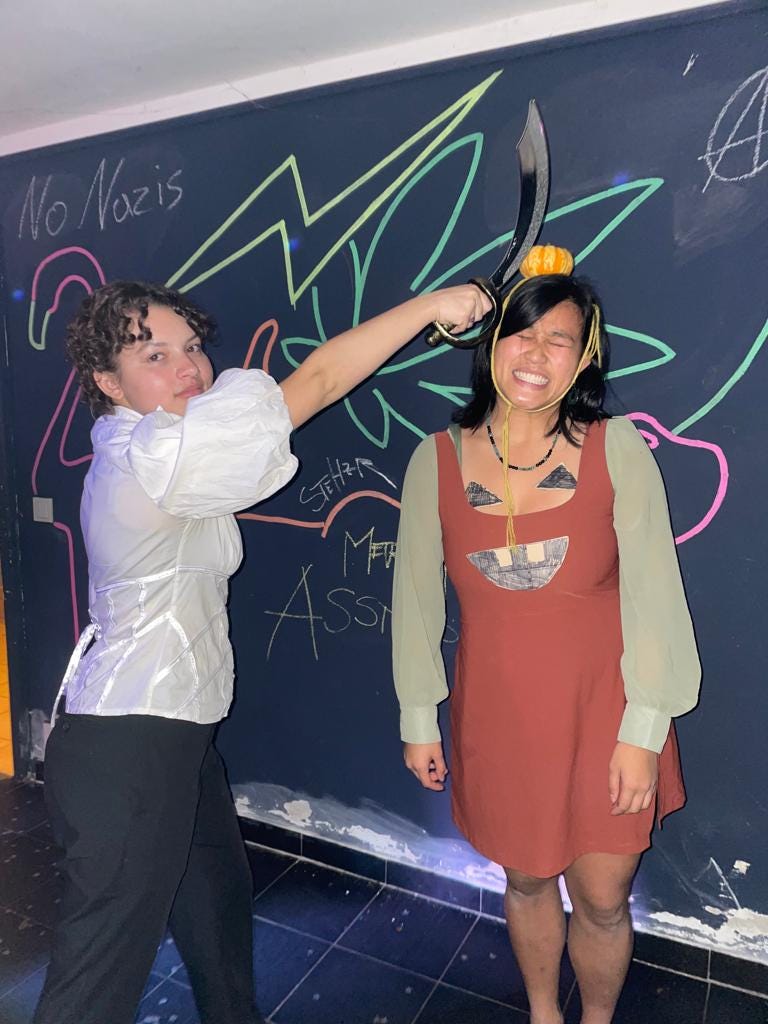
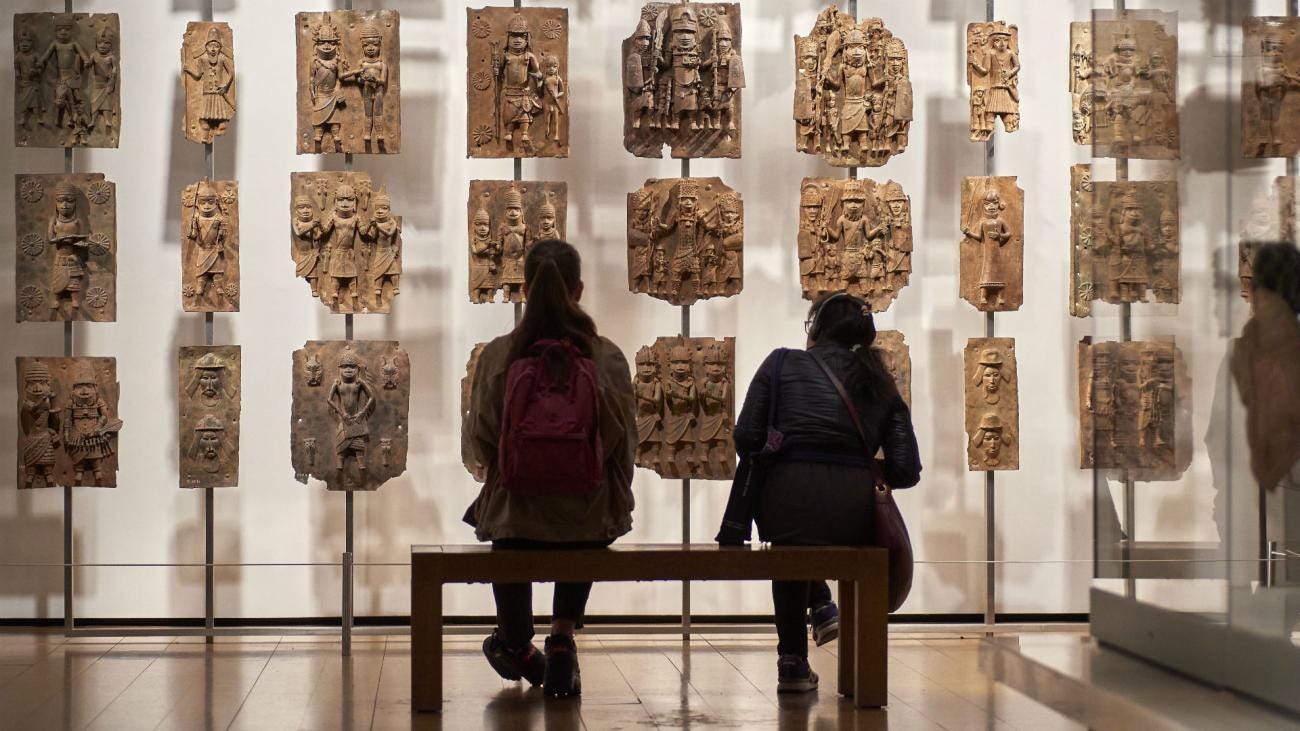
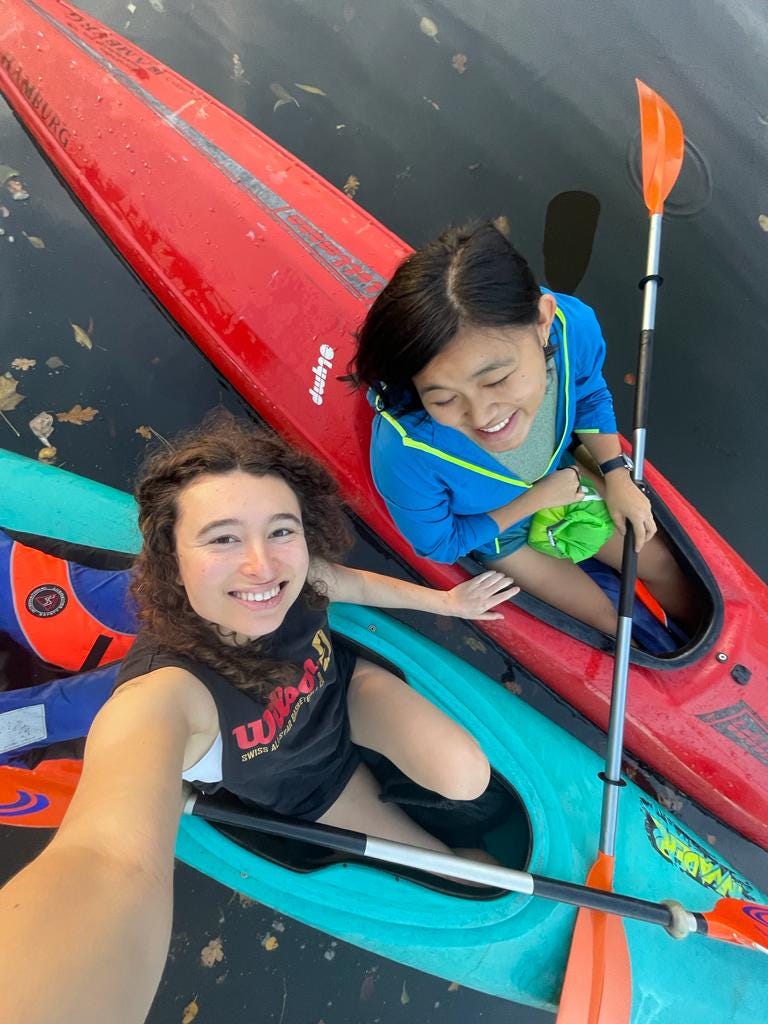
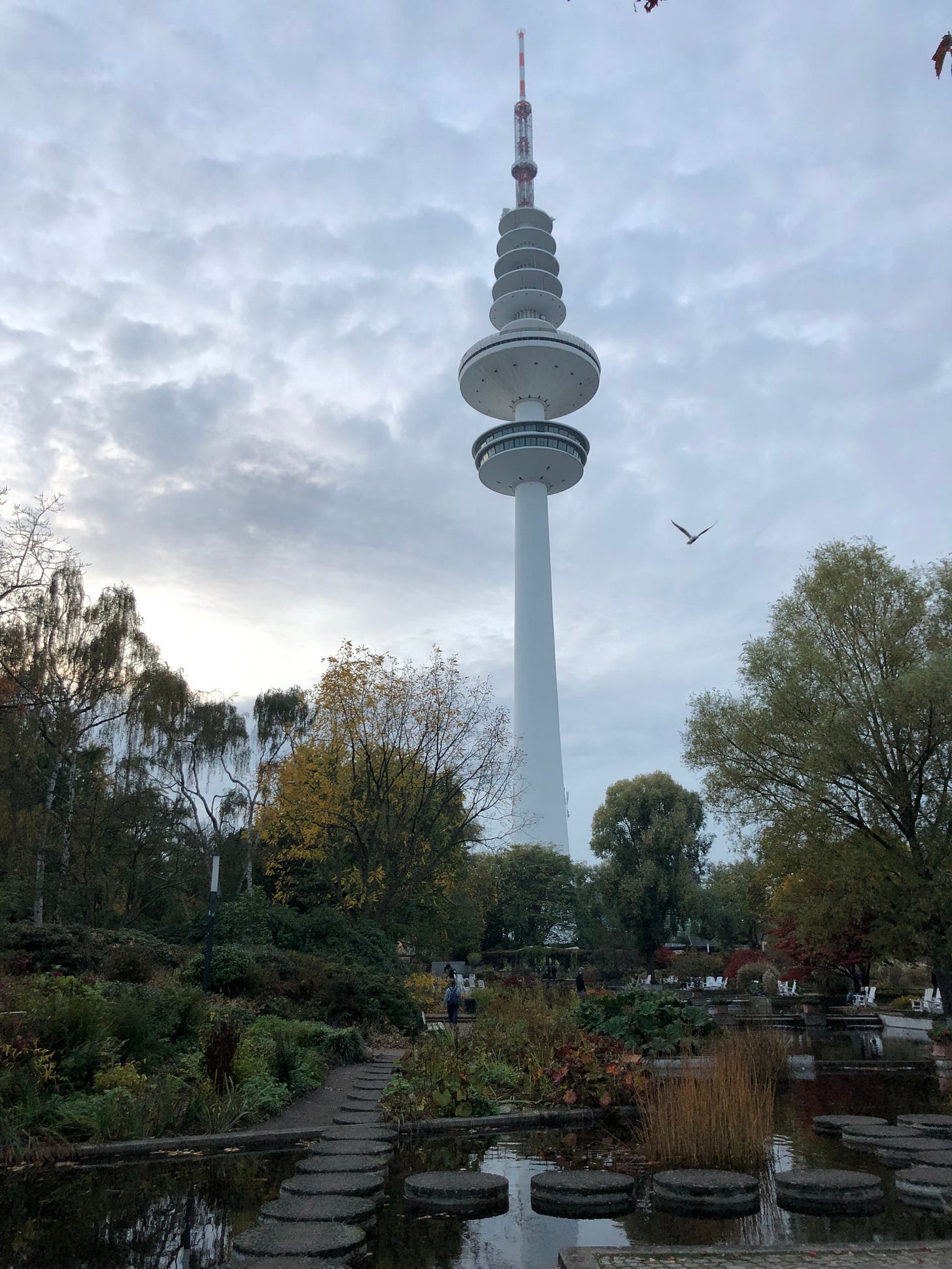
i am sad that we did not get the chance to meet up in Belgium or the Netherlands, nevertheless, Lily, I enjoy reading your columns. I am currently in France and had a discussion about race with a friend of mine that put herself through the French education system. Race is not discussed or if it is, happens in select circles, and no racial data is collected.
All the Americans I talk to about this are shocked, yet maybe this is a different way of imagining research and society? Just stipulating..